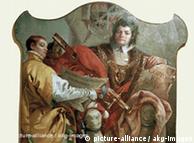A codex makes history........
A codex makes history: the Corpus Iuris Civilis of 529
Beginning in 527, the ambitious Justinian I (482 - 565) ruled the Eastern Roman Empire (Byzantium). His goal was to reinstate the single, vast Imperium Romanum. In the past centuries, the empire had suffered greatly under the Germanic people in central Europe, and the Huns from the east.
But it wasn't his efforts to reunify the empire that brought Justinian I lasting fame, rather the complete codification of Roman law. All across the land, legal scholars and scribes were at work, recording all the valid legal principles of their society. The Codex Justinianus, which later became known as the Corpus Iuris Civilis, was completed after five years and is the first systematic written record of Roman law.
But Justinian didn't leave it at that. He commissioned the most important jurist of his day, Flavius Tribonianus (ca. 485 - 542) to review and comment on the laws. As a quaestor (Roman magistrate), Tribonianus was responsible for the judicial apparatus of the Eastern Roman Empire. It was largely due to him that the codex was finished in such a short time. Not long after, a judicial textbook and a collection of decrees were published, so that by 533, the first complete reference guide to Roman law was available.
Empress Theodora
Justinian I ruled for roughly four decades, during which he was energetically supported in all manners political and private by his wife, Theodora I (ca. 500 - 548). When Justinian was crowned emperor in the summer of 527, he gave Theodora the title "Augusta" ("the great"), thereby elevating her from the ranks of emperors' wives past. He is known to have described Theodora as his "God-given partner," and her influence on his politics is likely to have been considerable.
The desire to reconstitute the Roman Empire (restauratio imperii) was not just in respect to land, but also to the political legacy of the height of the Empire, the age of the great Caesars. A quote from the Bible prophesying the end of the world should the "fourth empire" fall played an important role in this. The Babylonian, Persian and Greek empires had already fallen. If the fourth empire - the Roman Empire - were also to fall, it would herald the end of the world. That's why Justinian I did everything he could to prevent this scenario from becoming a reality. He managed to banish the Vandals from the coast of northern Africa, and win the southern tip of Spain from the Visigoths. After a lengthy battle, he pushed the Ostrogoths out of Italy. Thus, he managed to return the area around the Mediterranean to Roman rule, although the recreation of the entire Imperium Romanum eluded him.
His successors limited themselves to the territory of the Eastern Roman Empire, which remained intact until Constantinople (modern day Istanbul) fell to the troops of the Ottoman Sultan Mehmed II on May 29, 1453.
Legal foundation for Europe
The true influence of the Corpus Iuris Civilis first revealed itself during the 14th and 15th centuries, when the texts were rediscovered by members of the university in Bologna and incorporated into contemporary legal discourse. Over many centuries, the codex proved to be a major resource, augmented by local legal principles. Similar texts followed suit: the "Allgemeine Landrecht" of Prussia in 1794, the French "Code civil" in 1807, or the "Buergerliche Gesetzbuch" of Austria in 1812. In Germany, the basic tenets of Roman law were valid until 1900, when the Civil Code was introduced. The Corpus Iuris Civilis is an example of the close connection between the Roman Empire of antiquity and the modern Europe of today.
Author: Matthias von Hellfeld (dc)
Editor: Andreas Illmer


Comments